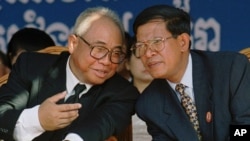Prime Minister Hun Sen is set to take over the presidency of the ruling Cambodian People’s Party, following the death of party leader Chea Sim last week.
The move will shore up solidarity in the party, which has become increasingly united, party members say.
Chea Sim, who was 82, had been a major party stalwart, following the ouster of the Khmer Rouge by Vietnamese-backed forces in 1979. He had fled Khmer Rouge purges along with some 300 people in 1978 and had been a powerful member of the CPP, formerly the Kampuchean People's Revolutionary Party, along with Hun Sen and Heng Samrin.
Um Sarith, a central committee member for the CPP, said Wednesday Hun Sen “is the only candidate” to take over, following a cremation ceremony Saturday.
The ceremony will be attended by government officials, foreign dignitaries and King Norodom Sihamoni at Wat Botum pagoda, in Phnom Penh. Some 30,000 people are expected to join in the mourning procession.
Um Sarith said the CPP is prepared for the ceremony and the handing over of power to Hun Sen. “The succession has been long thought through,” he said. The party’s core principle now is “solidarity,” he said. “The CPP was born long ago. It’s a mature party. If there is a problem, we sit down and figure it out.”
Government spokesman Phay Siphan said having Hun Sen as president of the party will help speed the country’s development. Both officials said meetings with party members at the commune level will continue. Phay Siphan too said the party was “strengthening its solidarity.”
Bun Tharith, deputy governor of Siem Reap province, said Chea Sim’s death was not having an affect on that solidarity at the provincial level. Regular meetings every month have bolstered party cohesion there, too, he said.
However, some political observers say the loss of Chea Sim will have some effects on the party.
Koul Panha, head of the election group Comfrel, said Chea Sim had acted as a monitor for Hun Sen’s administration. That will no longer be there, and Hun Sen will be both the head of the party and the head of the executive branch of government, he said. “The system of checks and balances won’t be working.”




